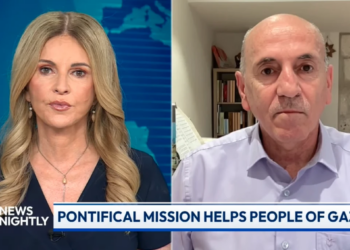Friedrich Nietzsche once wrote that thoughts come on dove’s feet and steer the world. Advocates of economic liberty must hope that the master thinker was, for once, mistaken. Because in the case of capitalism’s comeback, it’s more the metaphorical chainsaw that’s leading the way.
Argentina’s President Javier Milei, who made the aggressive chainsaw meme a central campaign symbol in 2023, speaks not in subtle fugues but in fortissimo. A brief sample from a 2021 interview with La Nación: “The state is a criminal mechanism by which a majority steals money from the rest.”
Music to the ears of libertarians, long marginalized and ridiculed for defending the free market by a leftist-statist majority. But Milei, a principled libertarian, recognized that defeating the deeply rooted socialism embedded in minds and media alike requires clear and unflinching language. Socialism tends to resurface across generations — a kind of ideological herpes that doesn’t respond to homeopathic treatment. What’s needed is a hard shock therapy.
Milei’s Shock Therapy
And that’s exactly what Milei offered his Peronism-plagued nation in 2023 — and Argentinians took him up on it. The bitter memory of a currency collapse just five years earlier, followed by a crippling economic crisis, was still fresh. For once, the link between an overgrown state and societal decay was too obvious for the media to obfuscate, as is still common practice in Germany, for instance.
In record time, 50,000 federal bureaucrats were dismissed — 9.6 percent of the public workforce. The number of ministries was cut in half. Public sector salaries were reduced. Government spending dropped from 39 percent to 32.7 percent of GDP, with a target of 25 percent. A revolution in the power dynamic between citizen and state. Once again, the chainsaw made its appearance. Against the Leviathan of the state, it remains the weapon of choice.
That 6 percent reduction in the state’s footprint is transformative: less parasitic extraction, more space for real enterprise, entrepreneurship, and decentralized investment. Only under such conditions can an economy truly prosper.
It’s this seemingly small, but in truth massive, shift that promises to give Argentina a new identity. If Milei succeeds, he becomes a dangerous antagonist to the prevailing order. He will be the counterpoint who, with clarity and flair, exposes the failings of centralized, invasive governance as practiced in the EU.
Bold Even on Enemy Ground
Like a sculptor removing excess marble, Milei carves away at decades of bloated dysfunction, envisioning a lean, functional state — fit to fulfill its primary duties of internal and external security. His policies carve out space for personal responsibility, initiative, and growth. By drawing boundaries around state power, he throws open the gates for the private sector.
At the World Economic Forum in Davos 2024, Milei offered one of his now-famous provocations, holding up a mirror to the pilgrims of global statism: “Socialism is a failure — economically, culturally, and morally.”
Rarely has a G20 leader spoken with such blunt clarity about the dangers of socialism and European statism. One senses that Milei draws vital energy from the tension between freedom and the coercive bureaucratic state.
A First Rich Harvest
And his bold strategy is paying off. Argentina’s economy exploded with 5.8 percent growth in Q1 this year. Private consumption surged 11.6 percent. And as if the country’s long-standing inflation curse had been lifted, the rate in May fell to just 1.5 percent. This train seems unstoppable.
What a break from the old regime: Under the socialist Kirchners, inflation served as a stealth tax and tool of expropriation. Argentina, once a wealthy society, paid dearly to prop up a centralized state. But Milei has cut off a hidden lifeline — because inflation benefits debtors with fixed nominal obligations. And no debtor is bigger than the modern hyper-state, which profits handsomely from inflation via progressive tax brackets and static income thresholds.
Argentina’s comeback story could fill volumes, but one more metric should suffice: Morgan Stanley projects that the credit market — often a telltale sign of investor confidence — will grow by an astounding 50 percent this year. Mortgage lending? Up 260 percent in just 12 months. Argentinians are beginning to believe in their future again.
Fortune Favors the Bold
A bit of good fortune helps Milei’s cause: his reform blitz coincides with a regional recovery and a weakening U.S. dollar — reducing refinancing pressure on Argentina’s debt pile. That buys him room to deepen his reforms and restructure the state.
And given Milei’s media savvy, it’s easy to imagine him turning this triumph into a meme: “The state is not the solution — it’s the problem.”
A hard-edged mantra that predictably shocks statist Germany. But for those willing to examine Germany’s problems without ideological blinders, Milei’s whip-smart insight could prove enlightening. Rolling back the state would address a host of issues — from mass migration into welfare systems, to fiscal overreach, to crushing bureaucracy.
But that will only happen when politicians have exhausted their last reserves of credibility — and voters finally demand the state Leviathan be cut down to size.
Berlin’s Greenhouse
To Germany’s green radicals, “Debt Lars,” and socialist engineers, Milei’s success story might as well be written in Martian. In Berlin, central planners, redistributionists, and climate neurotics gather for an endless séance in honor of the control society.
They’ve found the perfect ecosystem: a politically nurtured greenhouse where their ideology thrives. The city has become a psychological greenhouse for the very strains of thinking now overrunning society.
One more Milei quote — freely translated: “Give socialism the reins, and it’ll end in misery — just more equally shared.”
And the seeds of German socialism are sprouting fast. The state’s share of GDP is barreling toward the 50 percent mark. Berlin’s elites are determined to breach it. With a trillion euros in new debt planned, they aim to rewrite the legacy of 90 years of Keynesian failure.
But economic gravity will end this ideological joyride. Bond markets will erect a wall — and Berlin’s policies will slam into it like flies on a windowpane.
Intellectually hollowed out, historically blind, and ideologically obstinate, Germany is marching in the opposite direction of Milei. Somewhere down the road, their paths will cross. They may nod politely, but they won’t understand each other.
One path leads upward.
The other, downhill.
READ MORE from Thomas Kolbe:
Battle for Free Speech: EU/Europe Deploys Its Artillery
Carbon Tax and the Green Deal: The EU’s Climate Heist Is Underway
Meloni’s Italy: A Refreshing Crescendo to Brussels’ Dissonance




![Man Arrested After Screaming at Senators During Big Beautiful Bill Debate [WATCH]](https://www.right2024.com/wp-content/uploads/2025/06/Man-Arrested-After-Screaming-at-Senators-During-Big-Beautiful-Bill-350x250.jpg)












